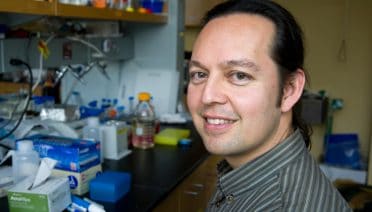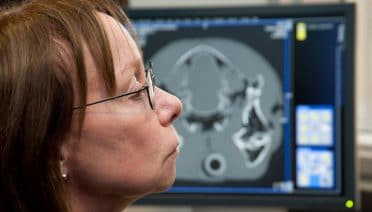Press Room
A group of oceanographic experts is calling for the establishment of a national network to monitor the diversity of marine life, a key bellwether of ocean and human health. Their work is described in the April 11 issue of BioScience.
Lead author, […]
Combined research efforts by scientists involved in the Gulf of Maine Toxicity (GOMTOX) project, funded by NOAA’s Ecology and Oceanography of Harmful Algal Blooms (ECOHAB) program, and administered by the National Centers for Coastal Ocean Science (NCCOS), have led to […]
Some thirty million years ago, Ganges river dolphins diverged from other toothed whales, making them one of the oldest species of aquatic mammals that use echolocation, or biosonar, to navigate and find food. This also makes them ideal subjects for […]
Explorer and filmmaker James Cameron and Woods Hole Oceanographic Institution (WHOI) have formed a partnership to stimulate advances in ocean science and technology and build on the historic breakthroughs of the 2012 Cameron-led DEEPSEA CHALLENGE expedition exploring deep-ocean trenches. The announcement comes on the […]
New England is expected to experience a “moderate” red tide this spring and summer, report NOAA-funded scientists studying the toxic algae that cause blooms in the Gulf of Maine. The “red tide” is caused by an alga Alexandrium fundyense, which […]
Scientists have confirmed that the pathogen that causes Lyme Disease—unlike any other known organism—can exist without iron, a metal that all other life needs to make proteins and enzymes. Instead of iron, the bacteria substitute manganese to make an essential […]
All living organisms rely on iron as an essential nutrient. In the ocean, iron’s abundance or scarcity means all the difference as it fuels the growth of plankton, the base of the ocean’s food web.
A new study by biogeochemists and […]
A continental-scale chemical survey in the waters of the eastern U.S. and Gulf of Mexico is helping researchers determine how distinct bodies of water will resist changes in acidity. The study, which measures varying levels of carbon dioxide (CO2) and […]
With more than 40 million people living under exceptional drought conditions in East Africa, the ability to make accurate predictions of drought has never been more important. In the aftermath of widespread famine and a humanitarian crisis caused by the […]
Two robots equipped with instruments designed to “listen” for the calls of baleen whales detected nine endangered North Atlantic right whales in the Gulf of Maine last month. The robots reported the detections to shore-based researchers within hours of hearing […]
The Woods Hole Oceanographic Institution (WHOI) announces a new Center for Marine Robotics. The Center brings together academic, national security, and industrial partners with the goal of applying the full potential of computation and intelligence to bear to the ocean.
“WHOI […]
There are more microbes in a bucket of seawater than there are people on Earth. Despite their abundance, humans are only just beginning to fathom the complex role marine microbes play in the ocean ecosystem.
These tiny creatures are responsible for […]
Scientists from the newly created Northwest Atlantic Seal Research Consortium (NASRC) are using data collected by the Massachusetts Department of Public Health (MDPH) to investigate whether seals may impact beach water quality along Outer Cape Cod.
A growing population of gray […]
Mak Saito, a biogeochemist at Woods Hole Oceanographic Institution, has been selected for a Marine Microbiology Initiative (MMI) investigator award by the Gordon and Betty Moore Foundation. Saito is one of 16 scientists from 14 different institutions who will receive […]
Darlene Ketten of the Woods Hole Oceanographic Institution has been named a Fellow of the American Association for the Advancement of Science (AAAS). Election as an AAAS Fellow is an honor bestowed upon AAAS members by their peers.
A marine biologist […]
Engineers from the Woods Hole Oceanographic Institution (WHOI) have developed a new wireless underwater communication system to control remotely operated vehicles (ROVs) in real time. This new method may eliminate the need for long tether cables, offering a new degree […]
People come from miles away to see the seals off the shores of Cape Cod and surrounding regions, but the animals are creating some challenges for local fishermen. Recent increases in local seal abundance have led to concerns about fisheries […]
Japan’s “triple disaster,” as it has become known, began on March 11, 2011, and remains unprecedented in its scope and complexity. To understand the lingering effects and potential public health implications of that chain of events, scientists are turning […]
The ability of deep-sea corals to harbor a broad array of marine life, including commercially important fish species, make these habitat-forming organisms of immediate interest to conservationists, managers, and scientists. Understanding and protecting corals requires knowledge of the historical processes […]
The Gulf Stream moved well north of its normal path in early November and mid-December of 2011, causing warmer-than-usual ocean temperatures along the New England continental shelf.


